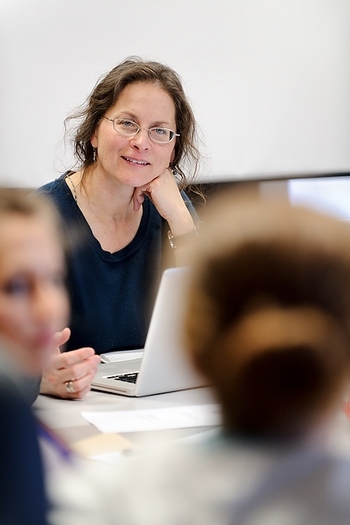Holidays can be challenging time to deal with grief
While the holidays can be filled with joy, they can also be a struggle for people grieving the loss of a loved one.
Betty Kramer, a professor in the School of Social Work, says it’s natural to have mixed feelings going into the holiday season.
“The holidays are often filled with unrealistic expectations for closeness and intimacy, and idealized versions of the happy family, which can exacerbate feelings of distress for those who are grieving,” Kramer says. “There is a lot of pressure on family members to play out traditions that have been done for years.”
Kramer says it’s important to not be too hard on ourselves if we’re not feeling the holiday spirit that we may have experienced in the past.
“The reality is that people experience exactly what they’re experiencing,” Kramer says. “It never helps anyone to put expectations on one’s feelings or response to loss.”
Traditions are wonderful, but it’s okay to re-evaluate, modify, or develop new family traditions if that will ease the grieving process, Kramer says.
“We actually have a choice in how we plan our holidays,” Kramer says. “Individuals who are grieving can sit back and think ‘What can I handle? What are my limits regarding the amount of social activities I can handle? What do I want and need from others during the holidays?’”
That might mean telling family members you can’t commit to a large gathering or other traditions and asking for help for some of the holiday tasks and responsibilities.
“We need to let people know what we need,” Kramer says. “It’s ok to set limits about what you can and can’t do.”
Reminiscing is part of the mourning process and it is natural to recall memories from past holidays. Talking about the person you’re missing may be helpful. New traditions can be created to honor a loved one, such as a candle lighting ceremony, writing notes expressing your feelings and sharing them with others, listening to music your loved one enjoyed or sharing favorite memories among family.
“Don’t be afraid of emotions that come up,” Kramer says. “It’s fine to grieve together. Often, it’s helpful.”
Reminiscing is part of the mourning process and it is natural to recall memories from past holidays. Talking about the person you’re missing may be helpful.
Kramer’s research includes aging, end-of-life caregiving and the role that family conflict plays in the experience of complicated grief. She has seen families respond to grief in numerous ways and reminds people that there isn’t just one way to grieve.
Avoiding the subject of someone’s death is like ignoring an elephant in the room, she says. That doesn’t mean grief has to be the focus of the holidays but by just acknowledging the subject, we honor the relationship that was and are better able to offer compassionate support to those who are grieving.
While it is natural to seek ways to soothe oneself during especially stressful times like the holidays, Kramer suggests not overindulging in alcohol since it’s a depressant and may intensify feelings of sadness.
While an outpouring of sympathy can come immediately after a death, offering continued support is appreciated. If you know someone who is grieving, especially a recent loss, Kramer says reaching out to them, offering to help with holiday tasks and being willing to listen can be extremely helpful.
“People are uncomfortable with death. They don’t bring that topic up because they think that will make the person sad,” Kramer says. “But you don’t make others sad by honoring and remembering their loved one. It can contribute to their suffering if the person feels they have to hide their grief because you are uncomfortable.”
Grief support groups, which are often offered at no charge by local hospice organizations, can also allow people to openly talk to others who may have gone through similar experiences.
Kramer is studying the factors that contribute to conflict in families at the end of life and how that conflict contributes to complicated grief following the death.
“What happens during the dying process may have a dramatic effect on family members for years to come,” Kramer says. “Being gentle and kind with one another is one of the most important gifts we can offer.”

